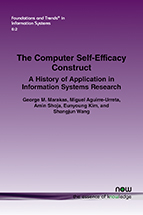The Computer Self-Efficacy Construct: A History of Application in Information Systems Research
By George M. Marakas, Florida International University, USA, gmarakas@fiu.edu | Miguel Aguirre-Urreta, Florida International University, USA | Amin Shoja, Florida International University, USA | Eunyoung Kim, Florida International University, USA | Shangjun Wang, Florida International University, USA
Abstract
This treatise intends to provide a comprehensive history of the computer self-efficacy (CSE) construct as it has been developed and applied within the field of information systems (IS) and within the broader academic communities that benefit from reference to IS research contributions. The authors intend to present the breadth and depth of understanding of the CSE construct. A framework of extant knowledge and comprehension and a clear picture of implications for future research within this knowledge domain are offered. In addition, a comprehensive literature review is provided in the Online Appendix.
We believe the principal contribution herein is the assemblage of the bulk of our understanding and knowledge regarding this construct and its associated streams of research into a single compendium. It is intended to facilitate future researchers to access the current thinking regarding the CSE construct and direct their efforts to the continued advancement of our understanding of computer self-efficacy.
The Computer Self-Efficacy Construct: A History of Application in Information Systems Research
Computer self-efficacy (CSE) has captured the interest of researchers from widely diverse knowledge domains for over four decades. During that time, the realm of computer adoption and use has evolved and flourished. Along with this evolution, our understanding of CSE, its utility in behavior modeling and training development, and its relationship to a diverse array of antecedents and precedents has continued to evolve.
This monograph provides a comprehensive history of the CSE construct as it has been developed and applied within the field of information systems (IS), and within the broader academic communities that benefit from reference to IS research contributions. The authors present the breadth and depth of the CSE construct and offer a framework of extant knowledge and implications for future research within this knowledge domain. The principal contribution of this work is the assemblage of the bulk of the authors’ understanding and knowledge regarding the CSE construct and its associated streams of research into a single compendium. It is intended to facilitate future researchers to access the current thinking regarding the CSE construct and direct their efforts to the continued advancement of our understanding of computer self-efficacy.

Online Appendix | 2900000023_app.pdf
This is the article's accompanying appendix.